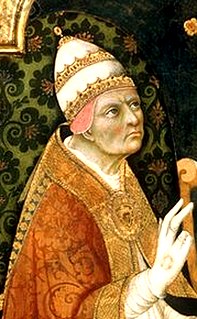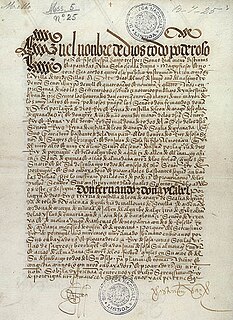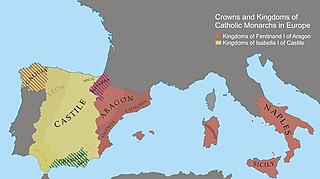
Pope Alexander VI was head of the Catholic Church and ruler of the Papal States from 11 August 1492 until his death in 1503.

Pope Callixtus III, born Alfonso de Borgia, was head of the Catholic Church and ruler of the Papal States from 8 April 1455 to his death. Borgia spent his early career as a professor of law at the University of Lleida; he later served as a diplomat for the kings of Aragon. He became a tutor for King Alfonso V's illegitimate son Ferdinand. After arranging a reconciliation between Alfonso and Pope Martin V, Borgia was made Bishop of Valencia. In 1444, Pope Eugene IV named him a cardinal, and Borgia became a member of the Roman Curia. During the siege of Belgrade (1456), Callixtus initiated the custom that bells be rung at midday to remind the faithful to pray for the crusaders. The tradition of the Angelus noon bell still exists in most Catholic Churches to this day. He was also responsible for the retrial of Joan of Arc that saw her vindicated. He appointed two nephews as cardinals, one of whom became Pope Alexander VI. He is the last pope to date to take on the pontifical name "Callixtus".

Year 1493 (MCDXCIII) was a common year starting on Tuesday of the Julian calendar.

Pope Nicholas V, born Tommaso Parentucelli, was head of the Catholic Church and ruler of the Papal States from 6 March 1447 until his death. Pope Eugene made him a cardinal in 1446 after successful trips to Italy and Germany, and when Eugene died the next year Parentucelli was elected in his place. He took his name Nicholas in memory of his obligations to Niccolò Albergati.

The Treaty of Tordesillas, signed in Tordesillas, Spain on 7 June 1494, and authenticated in Setúbal, Portugal, divided the newly-discovered lands outside Europe between the Portuguese Empire and the Spanish Empire, along a meridian 370 leagues west of the Cape Verde islands, off the west coast of Africa. That line of demarcation was about halfway between the Cape Verde islands and the islands entered by Christopher Columbus on his first voyage, named in the treaty as Cipangu and Antillia.
The Latin title Rex Catholicissimus, Anglicized as Most Catholic King or Most Catholic Majesty, was awarded by the Pope to the Sovereigns of Spain. It was first used by Pope Alexander VI in the papal bull Inter caetera in 1493.

The Spanish Empire, also known as the Hispanic Monarchy or the Catholic Monarchy during the early modern period, was a colonial empire governed by Spain and its predecessor states between 1492 and 1976. One of the largest empires in history, it was, in conjunction with the Portuguese, the first to usher the European Age of Discovery and achieve a global scale, controlling vast portions of the Americas, the archipelago of Philippines, various islands in the Pacific and territories in Western Europe and Africa. It was one of the world's most powerful empires of the early modern period, becoming known as "the empire on which the sun never sets", and reached its maximum extent in the 18th century.

The Catholic Monarchs were Queen Isabella I of Castile and King Ferdinand II of Aragon, whose marriage and joint rule marked the de facto unification of Spain. They were both from the House of Trastámara and were second cousins, being both descended from John I of Castile; to remove the obstacle that this consanguinity would otherwise have posed to their marriage under canon law, they were given a papal dispensation by Sixtus IV. They married on October 19, 1469, in the city of Valladolid; Isabella was eighteen years old and Ferdinand a year younger. It is generally accepted by most scholars that the unification of Spain can essentially be traced back to the marriage of Ferdinand and Isabella.

Inter caetera was a papal bull issued by Pope Alexander VI on the 4 May 1493, which granted to the Catholic Monarchs King Ferdinand II of Aragon and Queen Isabella I of Castile all lands to the "west and south" of a pole-to-pole line 100 leagues west and south of any of the islands of the Azores or the Cape Verde islands.

Dum Diversas is a papal bull issued on 18 June 1452 by Pope Nicholas V. It authorized Afonso V of Portugal to conquer Saracens and pagans and consign them to "perpetual servitude". Pope Calixtus III reiterated the bull in 1456 with Inter Caetera, renewed by Pope Sixtus IV in 1481 and Pope Leo X in 1514 with Precelse denotionis. The concept of the consignment of exclusive spheres of influence to certain nation states was extended to the Americas in 1493 by Pope Alexander VI with Inter caetera.
Romanus Pontifex is a papal bull issued several times over the 15th century, first in 1436 by Pope Eugenius IV and again in 1455 by Pope Nicholas V to King Afonso V of Portugal. As a follow-up to the Dum Diversas, it confirmed to the Crown of Portugal dominion over all lands south of Cape Bojador in Africa, along with encouraging the seizure of the lands of Saracen Turks and non-Christians. The bull's primary purpose was to forbid other Christian nations from infringing the King of Portugal's rights of trade and colonisation in these regions, particularly amid the Portuguese and Castilian competition for ascendancy over new lands discovered.
The Patronato system in Spain was the expression of royal patronage controlling major appointments of Church officials and the management of Church revenues, under terms of concordats with the Holy See. The resulting structure of royal power and ecclesiastical privileges, was formative in the Spanish colonial empire. It resulted in a characteristic constant intermingling of trade, politics, and religion. The papacy granted the power of patronage to the monarchs of Spain and Portugal to appoint clerics because the monarchs "were willing to subsidize missionary activities in newly conquered and discovered territories."

The Bulls of Donation, also called the Alexandrine Bulls, and the Papal donations of 1493, are three papal bulls of Pope Alexander VI delivered in 1493 which granted overseas territories to Portugal and the Catholic Monarchs of Spain.
Christopher Columbus, on his first Spanish-sponsored voyage to the Americas in 1492, sailed south from what is now the Bahamas to explore the northeast coast of Cuba and the northern coast of Hispaniola. Columbus, who was searching for a route to India, believed Cuba to be a peninsula of the Asian mainland. The first sighting of a Spanish ship approaching Cuba was on 28 October 1492, probably at Bariay, Holguín Province, on the eastern point of Cuba.

The 1689 papal conclave was convened after the death of Pope Innocent XI. It led to the election of Cardinal Pietro Vito Ottoboni as Pope Alexander VIII. The conclave saw previous factions join together because they lacked numerical strength, and saw the rise of the zelanti as a political force in the election of the next pope. Ottoboni was eventually unanimously elected with the consent of the secular monarchs, becoming the first Venetian in over 200 years to be elected pope.
Juan López was a Spanish Roman Catholic bishop and cardinal.

Dudum siquidem is a papal bull issued by Pope Alexander VI on 26 September 1493, one of the Bulls of Donation addressed to the Catholic Monarchs Isabella I of Castile and Ferdinand II of Aragon which supplemented the bull Inter caetera and purported to grant to them "all islands and mainlands whatsoever, found and to be found, discovered and to be discovered, that are or may be or may seem to be in the route of navigation or travel towards the west or south, whether they be in western parts, or in the regions of the south and east and of India".
Aeterni Patris Filius, also called Aeterni Patris, was a bull issued by Pope Gregory XV on 15 November 1621 that regulated papal conclaves. Together with the bull Decet Romanum pontificem of 1622, it formed the canonical basis for papal elections until the 20th century. The bull brought about many reforms to the papal election system, created structured rules, and sought to decrease the influence of organized factions within the College of Cardinals during the conclave as well as decrease the influence of secular monarchs on papal elections. It established general rules for the conclave process, while the later bull Decet Romanum pontificem addressed the ceremonial aspects of papal elections.

Casas del Tratado de Tordesillas are two united palaces located in Tordesillas, Spain. The negotiations that gave rise to the Treaty of Tordesillas took place there, through which Spain and Portugal shared the New World, giving rise to Ibero-America.
Franciscus Serafim de Freitas was a Portuguese jurist and canon lawyer.











